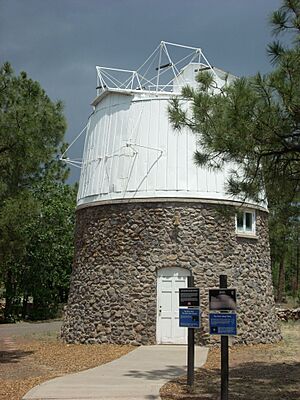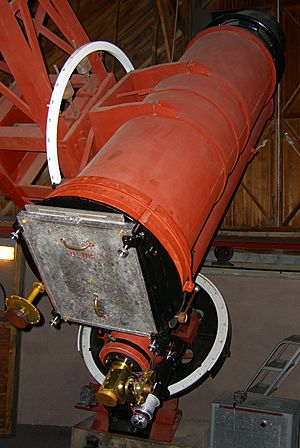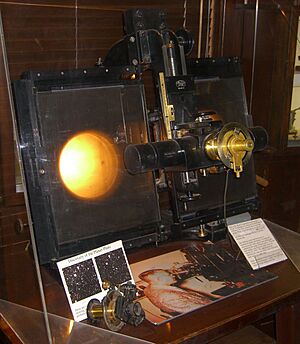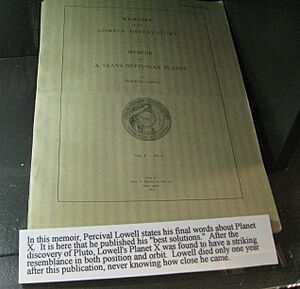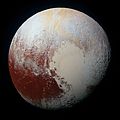Clyde Tombaugh facts for kids
Quick facts for kids
Clyde William Tombaugh
|
|
|---|---|
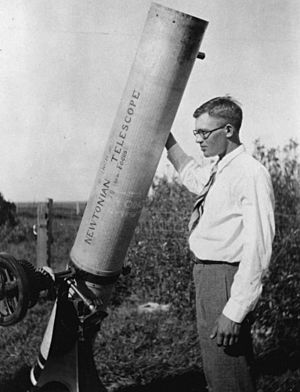
Tombaugh at his family's farm with his homemade telescope
|
|
| Born | February 4, 1906 in a ranch near Streator, Illinois, U.S.
|
| Died | January 17, 1997 (aged 90) Las Cruces, New Mexico, U.S.
|
| Nationality | American |
| Occupation | Astronomer |
| Known for | Discovery of Pluto |
Clyde William Tombaugh (born February 4, 1906 – died January 17, 1997) was a famous American astronomer. He is best known for discovering Pluto in 1930. Back then, Pluto was thought to be a full planet. But later, in 2006, scientists decided it was a dwarf planet. Tombaugh also found many asteroids and even encouraged serious studies of unidentified flying objects, also known as UFOs.
Life and Career
Clyde Tombaugh was born in Streator, Illinois. When he was young, a big hailstorm destroyed his family's farm crops. This made it hard for him to go to college right away.
But Clyde loved space! Starting in 1926, he built his own telescopes. He even made the lenses and mirrors himself. To make sure his telescope mirrors were perfect, he dug a long, deep pit. This pit helped keep the air temperature steady, which was important for testing.
Clyde sent drawings of Jupiter and Mars that he saw through his homemade telescopes to the Lowell Observatory. They were so impressed that they offered him a job! He worked there from 1929 to 1945.
After he discovered Pluto, Clyde went to college. He earned degrees in astronomy from the University of Kansas. During World War II, he taught sailors how to navigate using the stars. Later, he taught astronomy at New Mexico State University until he retired in 1973.
An asteroid discovered in 1931 was named 1604 Tombaugh after him. He found hundreds of asteroids while looking for other space objects. He even named some after his family! In 1931, he received a special award called the Jackson-Gwilt Medal for his work.
In 1980, he wrote a book about Pluto called "Out of the Darkness: The Planet Pluto." Years later, in 1992, a scientist called Clyde to ask permission to visit Pluto. Clyde joked that it would be "one long, cold trip!" This call helped lead to the launch of the New Horizons space probe. This probe finally flew past Pluto in 2015. A heart-shaped area on Pluto was later named Tombaugh Regio in his honor.
Discovery of Pluto
When Clyde Tombaugh started working at the Lowell Observatory, his main job was to find a new planet. Scientists like Percival Lowell had predicted there was a "Planet X" beyond Neptune.
Clyde found Pluto on February 18, 1930. He used special pictures of the sky that he had taken the month before. He compared these pictures using a machine called a blink comparator. This machine quickly switched between two images, making anything that moved or changed stand out. That's how he spotted Pluto!
The name "Pluto" was suggested by an 11-year-old schoolgirl. It was chosen because Pluto is the name of the Roman god of the underworld. This god could make himself invisible, which seemed fitting for a faraway, hard-to-see planet. Also, the first two letters, "PL," were the initials of Percival Lowell, who had predicted the planet. The name Pluto became official on May 1, 1930.
Asteroids Discovered
Clyde Tombaugh is officially credited with discovering 15 asteroids. However, he actually observed almost 800 asteroids while searching for Pluto and other objects! He also discovered a comet called 274P/Tombaugh–Tenagra. Besides planets and asteroids, he found hundreds of variable stars, star clusters, and even groups of galaxy clusters.
Death
Clyde Tombaugh passed away on January 17, 1997, in Las Cruces, New Mexico. He was 90 years old. A small part of his ashes was placed aboard the New Horizons spacecraft. This means a piece of the man who discovered Pluto actually traveled to Pluto!
Images for kids
See also
 In Spanish: Clyde Tombaugh para niños
In Spanish: Clyde Tombaugh para niños
 | William Lucy |
 | Charles Hayes |
 | Cleveland Robinson |


